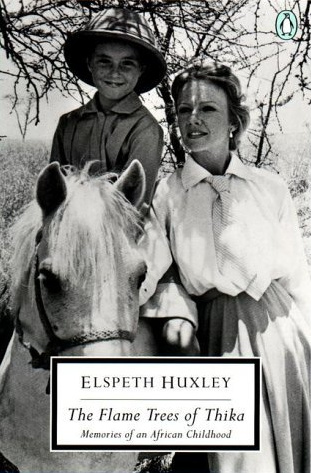

Elspeth Huxley · 281 pages
Rating: (4.6K votes)
“How much does one imagine, how much observe? One can no more separate those functions than divide light from air, or wetness from water.”
― Elspeth Huxley, quote from The Flame Trees of Thika: Memories of an African Childhood
“this was a moment of magic revealing to us all, for a few moments, a hidden world of grace and wonder beyond the one of which our eyes told us, a world that no words could delineate, as insubstanttial as a cloud, as iridescent as a dragon-fly and as innocent as the heart of a rose.”
― Elspeth Huxley, quote from The Flame Trees of Thika: Memories of an African Childhood
“Tilly was downcast; as with all perfectionists, it was the detail others might not notice that destroyed for her the pleasure of achievement.”
― Elspeth Huxley, quote from The Flame Trees of Thika: Memories of an African Childhood
“The best way to find out things, if you come to think of it, is not to ask questions at all. If you fire off a question, it is like firing off a gun; bang it goes, and everything takes flight and runs for shelter. But if you sit quite still and pretend not to be looking, all the little facts will come and peck round your feet, situations will venture forth from thickets and intentions will creep out and sun themselves on a stone; and if you are very patient, you will see and understand a great deal more than a man with a gun.”
― Elspeth Huxley, quote from The Flame Trees of Thika: Memories of an African Childhood
“...that's the way to tell a true story from a made-up one. A made-up story always has a neat and tidy end. But true stories don't end, at least until their heroes and heroines die, and not then really because the things they did and didn't do, sometimes live on.”
― Elspeth Huxley, quote from The Flame Trees of Thika: Memories of an African Childhood

“What sorts of sin?"
Any sort. When other people commit them, you are startled, but when you commit them yourself, they seem absolutely natural.”
― Elspeth Huxley, quote from The Flame Trees of Thika: Memories of an African Childhood
“...when the present stung her, she sought her antidote in the future, which was as sure to hold achievement as the dying flower to hold the fruit when its petals wither.”
― Elspeth Huxley, quote from The Flame Trees of Thika: Memories of an African Childhood
“The Destroyer has arrived and you are he.”
― J.R. Ward, quote from Lover Revealed
“Okay," I said. "I'd hoped to avoid this, but... Bill, I rescind your invitation into my house." Bill began walking backward to the door, a helpless look on his face, and my brush still in his hand. Eric grinned at him triumphantly.
"Eric," I said, and his smile faded. "I rescind your invitation into my house." And backward he went, out my door and off my porch. The door slammed shut behind (or maybe in front of?) them.”
― Charlaine Harris, quote from Club Dead
“More grass means less forest; more forest less grass. But either-or is a construction more deeply woven into our culture than into nature, where even antagonists depend on one another and the liveliest places are the edges, the in-betweens or both-ands..... Relations are what matter most.”
― Michael Pollan, quote from The Omnivore's Dilemma: A Natural History of Four Meals
“Did you say something Macey?' I asked, but she cut me a look that could kill. She reached into her bag, ripped off a sliver of Evapopaper, and scribbled:
'Can we study tonight? (Tell anyone, and I'll kill you in you sleep!)”
― Ally Carter, quote from I'd Tell You I Love You, But Then I'd Have to Kill You
“He pauses when he finishes undoing the last button, then closes his eyes. I can see the pain slashed across his face, and the sight tears at me. The Republic's most wanted criminal is just a boy, sitting before me, suddenly vulnerable, laying all his weaknesses out for me to see.”
― Marie Lu, quote from Prodigy
BookQuoters is a community of passionate readers who enjoy sharing the most meaningful, memorable and interesting quotes from great books. As the world communicates more and more via texts, memes and sound bytes, short but profound quotes from books have become more relevant and important. For some of us a quote becomes a mantra, a goal or a philosophy by which we live. For all of us, quotes are a great way to remember a book and to carry with us the author’s best ideas.
We thoughtfully gather quotes from our favorite books, both classic and current, and choose the ones that are most thought-provoking. Each quote represents a book that is interesting, well written and has potential to enhance the reader’s life. We also accept submissions from our visitors and will select the quotes we feel are most appealing to the BookQuoters community.
Founded in 2023, BookQuoters has quickly become a large and vibrant community of people who share an affinity for books. Books are seen by some as a throwback to a previous world; conversely, gleaning the main ideas of a book via a quote or a quick summary is typical of the Information Age but is a habit disdained by some diehard readers. We feel that we have the best of both worlds at BookQuoters; we read books cover-to-cover but offer you some of the highlights. We hope you’ll join us.